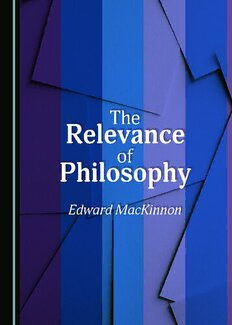
The Relevance of Philosophy PDF
Preview The Relevance of Philosophy
The Relevance of Philosophy The Relevance of Philosophy By Edward MacKinnon The Relevance of Philosophy By Edward MacKinnon This book first published 2018 Cambridge Scholars Publishing Lady Stephenson Library, Newcastle upon Tyne, NE6 2PA, UK British Library Cataloguing in Publication Data A catalogue record for this book is available from the British Library Copyright © 2018 by Edward MacKinnon All rights for this book reserved. No part of this book may be reproduced, stored in a retrieval system, or transmitted, in any form or by any means, electronic, mechanical, photocopying, recording or otherwise, without the prior permission of the copyright owner. ISBN (10): 1-5275-1656-3 ISBN (13): 978-1-5275-1656-4 TABLE OF CONTENTS Preface ....................................................................................................... vii Introduction ................................................................................................. 1 Chapter One ................................................................................................. 5 Early Philosophy The Enlightenment: The Triumph of Reason ......................................... 5 The Kantian Synthesis ......................................................................... 11 Post-Kantian Philosophy ...................................................................... 15 Chapter Two .............................................................................................. 21 Twentieth Century Philosophy Phenomenology ................................................................................... 22 Analysis ............................................................................................... 27 Chapter Three ............................................................................................ 43 Three Grand Syntheses Alfred North Whitehead ...................................................................... 43 Karl Popper .......................................................................................... 50 Bernard Lonergan ................................................................................ 63 Chapter Four .............................................................................................. 83 Science in Dialog Through the Labyrinth ......................................................................... 88 The Role of Categories ................................................................... 95 Quantum Physics ................................................................................. 98 Reductionism and Emergence ............................................................ 114 Can Consciousness Emerge in Computers ......................................... 121 Chapter Five ............................................................................................ 125 The Good Life Introduction ........................................................................................ 125 The Evolution of Public Morality ...................................................... 133 Survival Behavior ......................................................................... 135 Economics and Public Morality ......................................................... 148 vi Introduction Reactions to Unbridled Capitalism ............................................... 152 Micro and Macroeconomics ......................................................... 155 Inequality...................................................................................... 162 The Evolution of Rights ..................................................................... 168 Discussion and Public Morality ................................................... 175 Descriptive vs Prescriptive Morality .................................................. 190 Philosophical Reflections ................................................................... 204 Macroethics .................................................................................. 205 Microethics ................................................................................... 220 References .............................................................................................. 227 Index ........................................................................................................ 241 PREFACE This book represents the culmination of a protracted struggle to achieve some sort of overall philosophical coherence. I began my philosophical education as a Thomist, believing that a critical updating of Thomism had the potential to supply a framework in which philosophy, science, and theology could receive a coherent integration. The urge to integrate waned after spending some years studying physics, theology, and modern philosophy. Then Lonergan’s Insight was published. The neo- Thomistic position he developed seemed to present the type of integration that I, and many others, desired. A detailed critical analysis of Lonergan’s work convinced me that this unification rested on a faulty foundation. The metaphysical system he developed did not supply a depth explanation of reality, with science filling in the details. Nor did any other metaphysical system. There is no philosophical version of a Grand Unified Theory. During my teaching career at Boston College and California State University East Bay I focused on specialized studies in the philosophy and history of science with a concentration on the development and interpretation of quantum physics. This contributed to a growing realization that philosophy functioning as a collection of specialized sub- disciplines had lost the relevance it formerly had. Is there any way this relevance can be restored? A long retirement provided the opportunity to explore this question in detail and produce the present book. I am grateful to my wife and fellow philosopher, Barbara, and to the Ockegham Circle Discussion Group for presenting varying interpretations on many of the issues treated here. I also thank William Langan and A.J. MacKinnon for reading and criticizing the first drafts of the material presented here. INTRODUCTION Alfred North Whitehead, who will be treated later, claimed that a proper philosophical career develops in three stages: romance, precision, and generality. The romance commences in a juvenile infatuation with the great ideas philosophers through the ages have advanced to answer fundamental questions about reality, knowledge, truth, appearances, God, man, society, and morality. Precision characterizes the work of the professional philosopher focusing on specialized problems amenable to treatment by accepted philosophical methods and offering promises of publications. Generality should characterize the work of senior philosophers who return to the great ideas and can now treat them with technical precision and with an informed awareness of alternative treatments and their consequences. Whitehead’s own career manifested, and was undoubtedly the source for, this three-stage progression. Contemporary philosophy has largely morphed into a diverse collection of specialized studies. The goal of a transition from precision to generality may linger on, but is increasingly difficult to implement. This combination of specialized studies that only professional philosophers can understand and a systematic neglect of the depth issues traditionally regarded as basic philosophical issues has contributed to the widespread conviction that philosophy is no longer relevant. Scientists and humanists, treating the issues they consider fundamental need not, and generally do not, advert to philosophical treatments of these issues. How did this neglect develop and what can be done to change it? In medieval times philosophy reigned as queen of the sciences. Subsequently, the sciences, starting with physics, gradually withdrew from the reign of philosophy and became autonomous disciplines. In the Enlightenment era, a new sort of philosophy emerged. It centered on public dialog among ‘philosophs’, people, often not professional philosophers, who were interested in philosophical issues. Philosophy assumed the status of a constitutional monarch, reigning but not ruling. Immanuel Kant fashioned a new architectonic, relating philosophy to science, ethics, art, and government. The nineteenth century featured different developments that altered the role of philosophy. Hegel dominated the effort to go beyond Kant and develop philosophy as an idealistic system. Subsequent trends were
